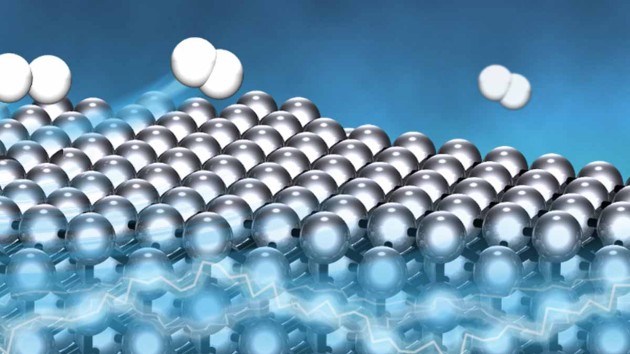Focus |
Collections
-
-
Focus |
 Nanoplastic
Nanoplastic
Plastic dispersed in the environment eventually fragments in minuscule particles known as microplastic and nanoplastic.
Image: Artwork by Thomas Kast, PhD -
Focus |
 Interlayer excitons
Interlayer excitons
When two or more individual monolayers are placed together to form an artificial homo- or heterostructure, the real van der Waals (vdW) architecture begins offering reach electronic, optical and magnetic phenomena oftentimes utterly unlike the monolayer case.
Image: Fabien Vialla -
Collection |
 Bioelectronic interfaces
Bioelectronic interfaces
In health and biomedical applications, electronic technologies allow monitoring, sensing and extracting physiological data as well as correcting or supporting tissue function through electrical stimuli. This collection highlights the recent developments in materials science, electronics and biology of bioelectronic devices.
Image: Andriy Popov / Alamy Stock Photo -
Insight |
 Clean Water
Clean Water
Water is arguably the most fundamental natural resource for life. But the availability of clean water for all the needs of modern society is becoming a challenging issue.
Image: Stephen Buford / EyeEm / Getty -
-
Collection |
 Electrocatalysis for fuels
Electrocatalysis for fuels
Efficient redox catalysis offers an important avenue in using renewable energy to process fuels. To this end, efforts in homogeneous, heterogeneous and microbial catalysis may each advance our fundamental understanding and technological capabilities.
Image: David Schilter/Rachael Tremlett -
-
-
-
-
Focus |
Quantum dot solids
Colloidal quantum dots are often referred to as artificial atoms, primarily because of their atom-like electron energy spectrum. Like atoms, they can form ordered structures that are commonly referred to as quantum dot solids. In this focus we provide an overview of the electronic properties of quantum dot solids. In particular, we explore the developments that have led to the observation of high electron mobility, and the challenges and opportunities for the incorporation of quantum dot solids in optoelectronic devices.

 Art&science
Art&science
 NatureTech
NatureTech
 Environmental assessment
Environmental assessment
 Ten years of Nature Nanotechnology
Ten years of Nature Nanotechnology
 Advanced nanopores
Advanced nanopores
 Metamaterials for nano-optics
Metamaterials for nano-optics